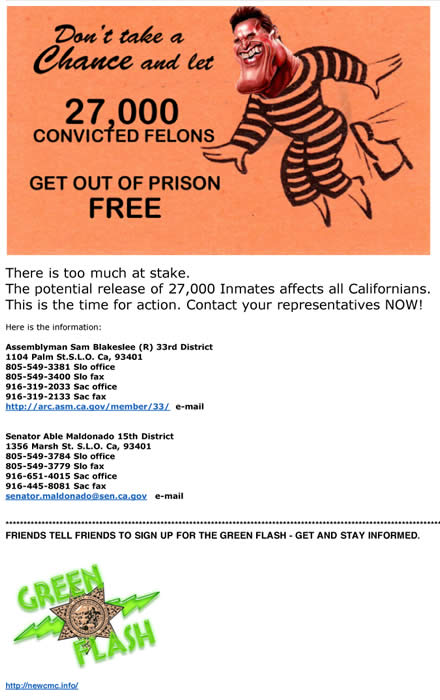Prison guards – aka correctional officers – are not the enemy. Yes, California’s correctional officers make a lot of money compared to their counterparts in other states. Yes, they have formed a wealthy, politically ruthless lobbying powerhouse, the California Correctional Peace Officers Association (CCPOA), which has repeatedly stood in the way of much-needed reform. And, yes, my organization went head to head with them when they self-interestedly opposed a 2008 ballot initiative we sponsored that would have safely reduced the prison size while investing in better drug treatment. Their fear-mongering ads convinced voters to keep drug offenders locked up at a cost of one billion dollars per year (so if you are wondering why your elementary school is closing two weeks early this year, it’s at least in part because CCPOA and other fans of big prisons don’t want petty offenders to get two weeks off their sentence).
Despite all this, correctional officers aren’t the enemy… not this week at least. Not since Governor Schwarzenegger proposed privatizing California’s prison system. There’s only one thing worse than fighting the CCPOA for reform of California’s prisons – and that’s fighting major corporations that are even less transparent and accountable to the public and that are dedicated solely to boosting profits for their shareholders.
The governor is right to push for big cuts in runaway corrections spending, but the problem of our overcrowded prisons isn’t a question of union corrections officers versus nonunion ones, or for-profit prisons versus state-owned prisons. It’s about addressing the massive sentencing inflation that prior governors and Legislatures indulged in. It’s about treating nonviolent or low-cost property crimes as misdemeanors (punished in county jails), and treating only violent crime or big money crimes as felonies (punished in state prison).
The state prison population has grown by over 500% since 1980, rising from under 30,000 to about 170,000 at the end of 2009. Who are all these people? Too many of them are guilty of petty offenses, what in prior years were misdemeanors that landed someone in jail for six months to a year. Now even petty offenses – including stealing a car radio or being in possession of a tiny amount of drugs – can land you in state prison for years at a cost to the taxpayer of $49,000 per inmate per year. If an inmate is older or has a health problem, multiply that figure (then subtract that from the budget for your local school or hospital).
Over 24,000 people are locked up in state prison for nothing more than a nonviolent drug possession offense. This policy alone – to punish unhealthy behavior with state prison rather than county jail or to offer drug treatment instead – costs taxpayers over $1 billion each year. And yet there is consistent, copious evidence that serving more time behind bars does not reduce drug use; it may actually exacerbate the problem.
As a result of this and other bad policy choices – made over the years by voters as much as the Legislature – the state’s prison system is at nearly 200% of capacity, bursting at the seams and busting the budget. Overcrowding is such that the state system is under federal court receivership for failing to provide constitutionally adequate health care. Prisoners die of medical neglect and negligence every week.
And yet it could be worse. Operated by private companies, California’s prison system would be measured not primarily in terms of justice, public safety and rehabilitation, but by stock prices and profit margins. Prisoners would be products. Corporate growth would depend on increasing the number of prisoners and profits would depend on spending less on each of them.
In states where privatization is far more extensive than California, including Florida and Texas, private prisons have terrible track records. These companies have consistently cut corners, hired cheap and untrained staff and covered up scandals – all in the pursuit of profits. It’s noteworthy that these companies, led by the behemoth Corrections Corporation of America (CCA), have failed to deliver savings for state governments, though they have passed on sizeable profits to the companies’ shareholders.
Those profits are being leveraged in the California State Capitol. According to research from the Private Corrections Institute, CCA contributed $100,000 to Schwarzenegger’s initiative coffers last year. The company gave $174,000 to 40 sitting lawmakers, to candidates, and to the state Republican and Democratic parties as well in 2008.
Our state prison system is broken – there is no doubt. But privatization would make it worse, not better. We cannot outsource the dilemma to a private industry that puts shareholders’ interests ahead of public accountability and safety. We need to get back to basics. There are too many prisoners in California’s expensive prison system for petty crimes, for using drugs or stealing a bicycle. Our lawmakers need to roll back excessive sentencing and spending on prisons to protect our schools, the elderly, and healthcare, and to protect the state from wildfires and financial ruin.
































1 comment:
Damn, I don't believe it. Common sense!
Post a Comment